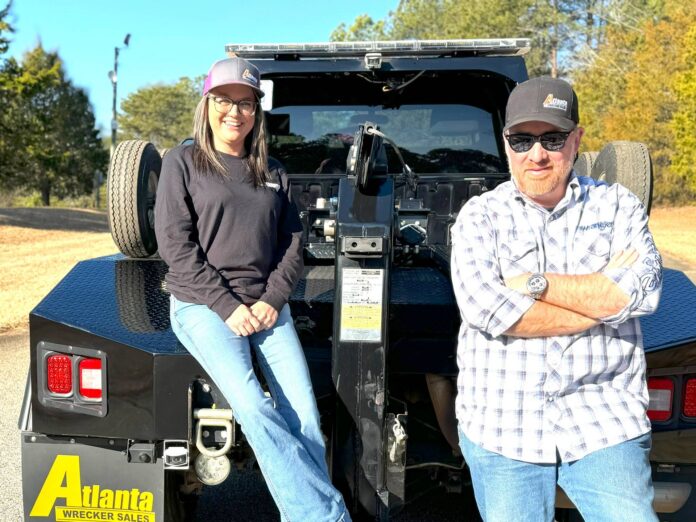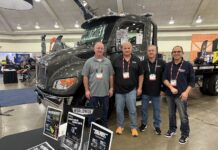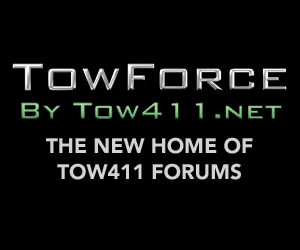By Matthew C. Fueston
Matthew C. Fueston is a writer and editor in the B2B space and has been writing for almost 15 years about “big iron” equipment and the men and women who rely on it. From towing and recovery, to construction, mining, and oil and water drill rigs, he puts the story of the real people in the field first and foremost. He may be reached at matt@fuestonassoc.com.
When Brittany Packard pulls up in her Ford F-450 fitted with a Jerr-Dan MPL-NGS integrated wrecker and jumps down from the cab, she knows that she is not what bystanders expected to see. In her own words, she is a “little bitty 5-foot 4-inch single mom of two that weighs maybe 125 pounds soaking wet.” But when it comes to recoveries, none of those things matter. She’s more than capable of doing the job.
Packard works for National Asset Recovery of Denver, North Carolina. Her story, by itself, is fascinating and inspirational. But more importantly for the industry, her story opens a window into the next generation of towing and recovery operators. It is safe to say that if one is not part of that new generation, one needs to understand that generation better—and this is especially true of owners and managers.
Brittany’s Story
Packard has worked in the asset recovery business for about four years now, but her desire to be in the cab goes back a lot further.
“My childhood dream was to be a repossession agent,” she said. “At least as far back as I can remember, I’ve been around people in this line of work. First it was my brother and his friends, and then later on, some of my own friends were in the recovery and towing business. I rode along with them. I got to see the job up close, and I knew that I wanted to do it myself.”
She finally got the chance to work for a recovery company, starting her career in a spotter car, also known as a camera car. Cameras in the car linked to a License Plate Recognition (LPR) system scan every plate they pass, searching for plates of vehicles that are scheduled for recovery. If such a plate is recognized by the LPR, it sends a notification to the recovery company, and the company then dispatches a truck to make the retrieval.
Packard knew that her job in the camera car was an important step in her training, but she wanted to repossess vehicles, not just locate them. As she says, “I wanted to pick them up put them down.”
However, she was told that a career behind the wheel of an actual recovery truck was out of the question. The job was just too physically demanding and too dangerous for a woman.
After a break for COVID, Packard applied for the position of recovery agent at every repossession company she could think of, but no one seemed to be interested. Finally, she went to work for National Asset Recovery in March of 2021. Again, she started in a camera car. She still wanted to drive the repossession truck, but she admits that all the earlier rejection had discouraged her.
She recalls her feelings at the time. “I just kind of shut down my desire to do the job I’d always wanted to do. I felt like, hey, nobody’s gonna give me that opportunity because I’m a female. As bad as it sounds, I would just have to get used to it. I just gave up that hope. I’m a single mom with two kids, I have to take whatever job is available.”
But when she began to make friends at NAR, and they heard about her dream to drive the truck, they asked if she’d ever broached the subject with management. She told them she didn’t want to get her hopes up and then be rejected. Again. But her new friends informed her that NAR had had a female in a truck a few years previously, and she had turned out to be a top performer.
“I told them—shut up! For real?”
Yes, for real.
“So, I went to the manager and told him that driving a snatch truck was my dream job. He wasn’t sure at first that I was serious, but on the other hand, he didn’t take that much convincing. For him, the question wasn’t whether I was male or female, it was, can I do the job?”
Marcus Potter, the owner of NAR, remembers it this way: “Frankly, I’m of the opinion that if you can do the job, you can do the job. If you can’t, you can’t. There are some physical challenges around the job of driving a tow truck, picking up dollies, crawling under vehicles and so on. So, we ran her through a battery of tests, and she was physically able to do those jobs. There were some skills she needed to improve, like any person new to a position, but I couldn’t see one reason why we shouldn’t give her a chance to prove herself. I think I can say that philosophy has worked for me. Right now, we have a fleet of 16 repossession trucks and four rollbacks, and three of the trucks used for recoveries have female drivers.”
Packard herself remembers a few very interesting practical details of that process.
“He told me, okay let’s see what you can do. Let’s go out here and get the dollies off the truck. He showed me how to get them off the truck, which for the most part I already knew how to do, just not at a professional level. And so, I took them off the truck and I struggled a little bit because like I say, I’m not what you’d call a big person.”
After she proved to her boss that she could physically do the job, he gave her some advice. “Go home,” he said, “but on your way home I want you to go to Walmart and pick up some 25-pound dumbbells. I want you to do curls every night until we start training.”
Packard wanted to increase her strength, as she knew it would be an asset in her new role, so she did as Potter suggested. She started her new strength-training regimen that same night. “That was in March,” she remembers, “and I think I was on the camera car for two months. After that I trained for a month and then by the end of June, I was in a truck on my own.”
Packard was not only in a truck doing the job she loved, but she also found herself in a truck that significantly enhanced her job satisfaction. “That Jerr-Dan MPL-NGS, that’s my baby. She came to me brand new,” Packard said. “I will not drive anything else. The job is hard enough and the equipment can make it easier or harder. My truck is easy for an operator of any size to use. That obviously means a lot to me. The smooth operation and great design of the Jerr-Dan bed is something else I really like. And the remote is very easy to use and handle, it’s not clumsy like some I’ve had to use.”
Potter buys his trucks from Atlanta Wrecker Sales of Chesnee, South Carolina. Packard sings the praises of the distributor for their response time when she needs parts or components. She also likes to accessorize her wrecker with pink whenever she can. Atlanta Wrecker Sales has responded with pink straps and other accessories whenever possible. “They are just a pleasure to work with,” Packard says.
Packard couldn’t be happier with her dream job. She works in an industry that provides the flexibility she craved as a single mom. She is provided with state-of-the-art equipment that she uses each day. In her private life, she had always driven cars and SUVs for personal transportation, even though she’d always wanted a pick-up truck of her own. Her new job made it possible for her to buy her first truck, a 2015 Nissan Titan. To top it all off, she was able to buy a new house for her family of three in December of 2022.
She is frank in her assessment of her employer. “Literally, if it wasn’t for Marcus none of this would have been possible at all. He wasn’t scared to give me the opportunity to succeed.”
Potter has his own thoughts about Packard’s progress and success.
“Brittany was a sponge, just trying to absorb everything. And she was smart enough to see the potential of the industry from a monetary standpoint. She really wanted to learn and had a great work ethic—still does. She had the ability to do the job and she is just such a go-getter. Once she got her feet wet, got some training under her belt and started doing the job, she became a top producer.”
“I admit that I am ecstatic about her success and that I was able to give her an opportunity but make no mistake about it. She is the one who did the work. So, she’s the one who gets all the credit.”
No Two Days the Same
Like many of her peers, Packard loves the variety and challenges of every workday. No two days are the same. And there are some people, like Packard, who struggle when faced with monotony.
“I might be at an apartment complex looking for a 2014 Chevy Malibu, and while I’m there my camera may get a hit on a 2017 F-150 that’s also on the list,” she said, describing a typical day. “And then I look at my map and see that my next pick-up is a jet ski a few miles away, and then a little bitty 50 cc dirt bike way out in the boonies. And when I get out to repo the little dirt bike, the woman in the house has to wheel it out of the kitchen.”
Packard is based out of a garage pretty much on the NC/SC state line and does recoveries in both Carolinas. She has city and rural territory to cover, and some of the rural areas are very remote.
“We have some places in remote areas where people meet you in their driveway with a shotgun regardless of your reason for being there. There are definitely areas that I won’t visit after dark, for safety reasons—no repo is worth your life. But sure, I’ve had a gun pulled on me. I’ve had a debtor put their hands on me.”
One important tool that helps Packard feel safer is the network of cameras she has in and on her truck, some pointed in the cab, others pointing out at various angles. And she is looking forward to the addition of body cameras soon. It is true that people act differently when they know that their actions and words are being recorded and are available for law enforcement review at any time.
But she will be the first to say that de-escalation is always her best tool for dealing with the high emotions that her very presence can cause. She is grateful to her trainer for his patience and advice in this area.
“He’s not working with us now, but he was my mentor in the field when I was in training,” Packard says. “I’m sure he’s why I’m still alive. He taught me that it’s all in how you de-escalate the situation. You have got to be able to use your words effectively and not lose your own cool. But there’s more to it than just staying calm yourself. You need to try to say the right thing for a certain situation. Sometimes you’ll say, ‘it’s okay, calm down,’ and that’s going to be the worst thing you can say to that person. They may be the type that shoots right back with ‘don’t tell me to calm down!’’
“I try to just talk with them in a mild, soothing voice. You know, ‘let’s discuss this. Let’s talk about it.’ I might say ‘the vehicle’s not going to be gone forever. There are options to get the vehicle back once you make a plan with the lienholder. Let’s talk about it. I’m not gonna rush off, you know? Go ahead and get some clothes on, it’s cold out here. We’ll talk about it.’ And once they see that you’re not some horrible, evil person and that you’re just there to do your job, most of the time, people cool down.”
“There is that 10% of humanity who will never be reasonable, of course. I had an elderly gentleman start yelling at me that he was a retired police officer who knew his rights and said that what I was doing was completely illegal. I just told him, ‘No, sir, everything that I’m doing is legal.’ In those situations, I have to apply a lesson that I’ve learned from my own life experience. And that is that you must have some steel and firmness underneath whatever you say, so they know they can’t just bulldoze over you.”
“But most of the time, even the feisty ones will cool down at the end, and a lot of times I have people apologize for getting so mad. They will even thank me for my patience with them, and for helping to calm them down.”
Packard also credits the extra training she and her co-workers have received, thanks to NAR and Potter’s focus on training and professionalism, from RecoveryMasters in Memphis, Tennessee. The training includes analysis of standard practices and safety, as well as legal guidelines particular to their own states.
What’s Next?
Albert Schweitzer, who won the Nobel Peace Prize in 1952, once said “Success is not the key to happiness. Happiness is the key to success. If you love what you are doing, you will be successful.” For her part, Packard certainly achieved happiness first—once she was given the opportunity to work in her chosen field. Hard work in that field led to the professional success she enjoys now.
Given that Packard is only 33 years old, she has a wide-open window to continue working hard, surprising bystanders every time she jumps down out of her pink trimmed Jerr-Dan wrecker. If the recent past is any guide, she will continue to reap the rewards of success and happiness.










